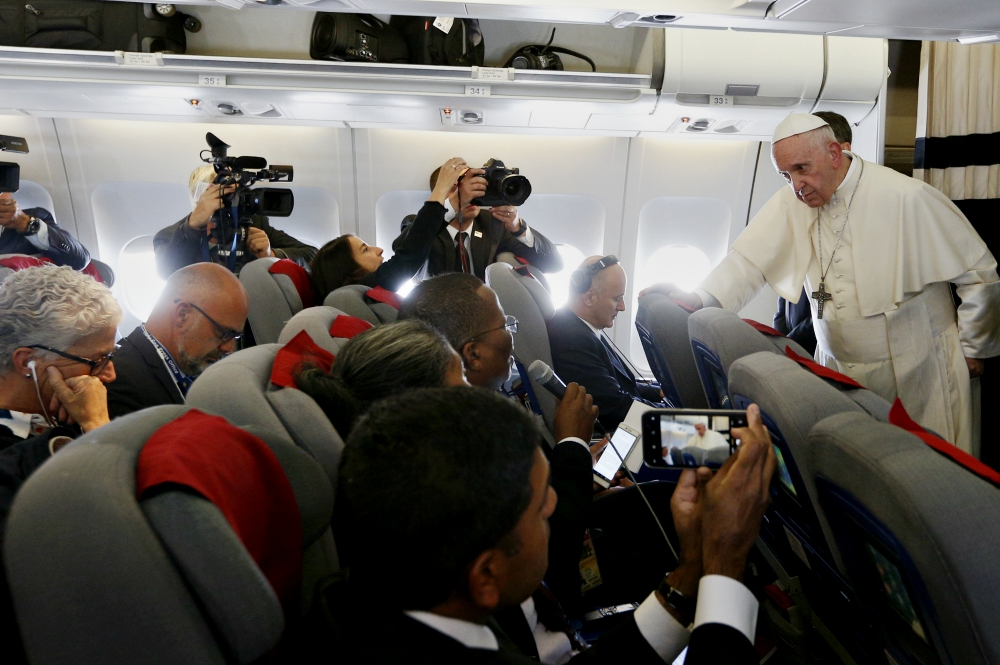
Pope Francis answers questions from journalists aboard his flight from Antananarivo, Madagascar, to Rome Sept. 10. (CNS/Paul Haring)
Pope Francis' blunt assertions about his opponents during his return to Rome from Africa not only marked how swiftly popes have become earthlings but suggest that Francis in particular is under worrisome stress.
From his warning about "ideology" infecting theology and his stunning admission that schism could happen, reported well by NCR Vatican correspondent Joshua J. McElwee, the pope's edgy remarks in response to reporters' questions indicate that the drumbeat of criticisms of his papacy is angering and preoccupying him.
This is not the public side the world has come to know — the compassionate, accepting, amiable face that has earned him a wide following. Rather, these stiff responses to sharp challenges hint at the inner man, the dimension that popes never intentionally displayed until recent decades.
The First Vatican Council (1869-70) put the finishing touches on a papal model far removed from the madding crowd, a figure approaching the status of a demigod, hermetically sealed away from ordinary commerce with humans, crowned with the council's award of infallibility on matters of faith and morals. The model was, to all intents and purposes, assigned to the tower, gazed upon with distant unapproachability by Catholic faithful.
The turnaround of that model is one of the most amazing developments in the past decades of religion. There was a time when editors grimaced and grumbled when I repeated that face-to-face interviews with popes were impossible. Popes were simply inaccessible except on their terms. Now, practically speaking, you wait in line.
Advertisement
Starting 60 years ago with Pope John XXIII's casting off of lofty papal symbols, and the pope's enormous popular appeal, that image began to change. Modern media exposed more about John and his successors. Pope John Paul II broke barriers between the Vatican and the press by giving impromptu interviews on airplanes, and gradually the person behind the office began to show itself.
None has taken it so far as Francis, who, from the beginning, opened himself to magazine and television articles and specials, creating a vast audience for his essentially progressive views on things like ecology, human rights and clerical privilege. Holding that back to an immeasurable degree is the ongoing calamity of sex abuse charges against priests and bishops. That has yet to play out.
But as his latest comments show, Francis has at the same time bristled over the attacks from detractors among prominent Catholic writers and clerics who accuse him of selling out aspects of authentic tradition. Though he maintains a warm, gregarious demeanor in his appearances, his direct effort to defend himself and to infer that political (ideological) motives have been employed to discredit the church's, and his, theology, point to a pope who has been deeply affected by those critics and may be suffering considerable inner turmoil.
It may also disclose painful realization that his best intentions receive nowhere near ready deference from most Catholics.
Francis, in his comments, projects woundedness. He has reached out to address the church's many deep crises and has faced defiant opposition on most fronts. From the start of his papacy, he has had an inclination to couch his hopes in brief clues but provides few if any action plans to back them up. He shuns autocratic rule and seeks decisions through consultation and consensus. He has received little of that; instead, resistance and confrontation from insiders.
If he is now showing shock and chagrin, and a strain of emotional reaction that becomes far-fetched (whose "ideology" for example?) or overwrought, it could be a sign of serious despair.
Astonishingly, he allows that schism could take place, prays that it doesn't, but says, "I am not afraid." It is that bad. He speaks as a leader whose movement is falling apart. Did Pope Leo X say something similar before Martin Luther nailed his 95 Theses to the Wittenberg church door?
All of this coincides with the emergence of popes beyond the seclusion of sanctuaries as popes have become astoundingly humanized. Francis, in effect, walks among us unfettered and says what appears to be on his mind without the layers of word managers preparing the statements. But he has opened himself to rejection and hurt, something popes were not exposed to in earlier times.
There is power in mystery and secrecy, misleading as it may be, and Francis has chosen to forsake that. Pope Paul VI said little but looked stricken by the internal wars and massiveness of the job. John Paul II had the confidence and courage to give some of himself while disclosing little of his darker moments. Francis' predecessor, Pope Benedict XVI, explained his retirement as due to failing health but many observers believe the pressures and conflicts of the job broke him down.
Francis may be on the fringes of something similar, perhaps taking more of the offensive as a means of taking his critics' challenge, or retreating into less risk and quieter initiatives. But his comments on the airplane appear to signal a disquiet and urgency that warrant close attention to the pope's well-being and the politics of the Vatican.
[Ken Briggs reported on religion for Newsday and The New York Times, has contributed articles to many publications, written four books and is an instructor at Lafayette College in Easton, Pennsylvania.]







